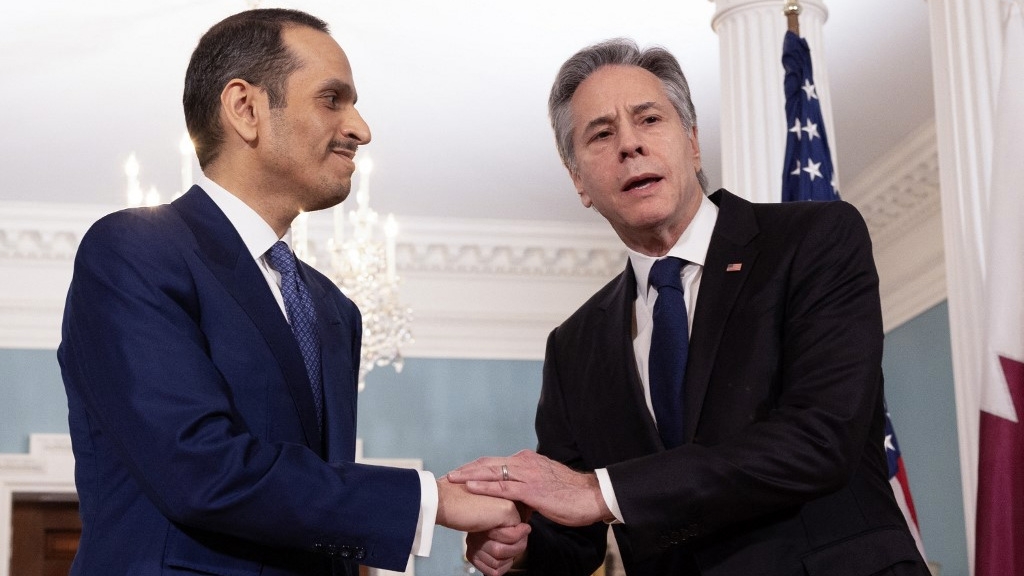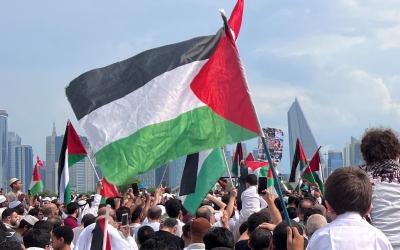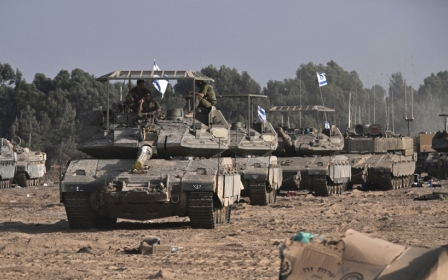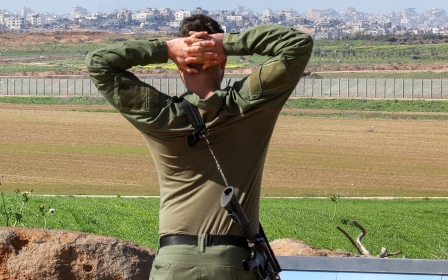War on Gaza: Why Qatar won't let Hamas go just yet

The roadmap to a diplomatic solution in Gaza has been stalled for months. The little trust that was built between Israel and Hamas during the short-lived pause in fighting last November has since been eroded by parties on both sides, for whom this conflict is about political survival.
Meanwhile, mediator Qatar has come under increased pressure from narrow political interest groups in Washington, triggering a debate in the Gulf state about the utility of its relationship with Hamas moving forward.
Some voices in Doha feel that the burden of hosting the political leadership of the militant group, an arrangement the US has long endorsed, is starting to outweigh the benefits of being the go-to diplomatic broker in Palestine. Especially within the polarised Washington bubble, where pro-Israel lobbying networks have gone into overdrive since the Hamas-led attacks on 7 October, pressure on Qatar from US lawmakers in campaign mode is mounting.
Earlier this month, Qatari Prime Minister Mohammed bin Abdulrahman Al Thani said his nation was conducting a comprehensive evaluation of its mediation role.
It is important to remember that Hamas has grown into a powerful instrument of Qatar’s network-centric statecraft. The monopolisation of that relationship has allowed Doha to insert itself into the fabric of the Israel-Palestine conflict as an indispensable hub for dialogue and mediation.
Stay informed with MEE's newsletters
Sign up to get the latest alerts, insights and analysis, starting with Turkey Unpacked
As part of the small state’s longstanding quest for global relevance, the Hamas link established Qatar as a crucial broker for stability in 2014, 2021, 2022 and last year. It has elevated Qatar’s status not just in the eyes of the US and other western powers, but also among many in the Islamic and Arab world as a rare defender of the Palestinian cause amid a wider unconditional normalisation trend.
In Doha, the Hamas question has always been a pragmatic cost-benefit analysis. As of late, the costs of this relationship are rising, while the strategic benefits appear to be stagnating. Nonetheless, make no mistake: the Hamas card has been a unique selling point for Qatar over the years, generating invaluable strategic advantages.
Electoral pressures
Since 7 October alone, Doha has been able to effectively leverage its connectivity in this conflict. So far, Qatar is the only party that has been able to achieve tangible objectives, negotiating a much-needed humanitarian ceasefire and the release of 105 hostages. Israel, Hamas and the US have failed to offer any credible avenues out of the carnage in Gaza.
For Qatar’s leadership, much hinges on the White House’s (so far ambiguous) positioning towards the conflict and the role of both Qatar and Hamas in it. The Biden administration has been trying to toe a blurry line on the matter, repeatedly praising Qatar’s efforts, while also unequivocally ruling out any role for Hamas in postwar Gaza, amid electoral pressures in a close race to the White House this year.
Follow Middle East Eye's live coverage of the Israel-Palestine war
Consequently, there have been signals from the White House to Doha that after a successful mediation effort, Hamas should leave Qatar - an unhelpful suggestion amid Doha’s delicate efforts to get the militant group to agree to a diplomatic roadmap out of the conflict.
Whether it is called Hamas or something else, brokers and mediators will be required to engage with it moving forward
What’s more, as it becomes clear that Israel will not be able to militarily defeat Hamas, it is very likely that the brand will survive the war. The Palestinian constituency for resistance against Israel has grown rather than diminished in this war - even as popular opposition to Hamas as an organisation in Gaza is on the rise.
Israel’s devastating war has had the polar opposite of the desired effect, as Tel Aviv has run blindly into the trap set by Hamas. The more Israel kills and destroys, the more people in Gaza and the occupied West Bank are pushed towards resistance. The idea of resistance is bigger than the Hamas brand and will organise one way or another.
Just as the idea of resistance will endure, the Hamas brand will also likely survive in some form. This is because Israel, with or without Prime Minister Benjamin Netanyahu, is trapped in the strategic hubris of believing that operational, military solutions will be enough to address the sociopolitical root causes of the conflict.
No decapitation strike or number of killed Hamas fighters will change the fact that the resistance movement continues to grow. Whether it is called Hamas or something else, brokers and mediators will be required to engage with it moving forward.
Regional tentacles
Thus, any White House - even that of Trump 2.0 - will require the assistance of a trusted and reliable broker to deal with that constituency in Palestine. Several alternatives to Qatar have been tabled in recent weeks. Turkey is an unlikely candidate to host Hamas, primarily as Israel fears Ankara could not be as easily leveraged as Doha. Meanwhile, President Recep Tayyip Erdogan as an aging statesman will not be able to provide Hamas with long-term assurances.
Some have suggested that Oman, another trusted broker in the region, could host Hamas. But while unequivocally backing the Palestinian cause, Muscat has no ambitions to get involved. Unlike Qatar, it lacks the inroads not just with Palestinian groups, but most importantly with Israel. In addition, Oman is already quite burdened with assisting the US and its allies to broker peace and stability between the straits of Hormuz and Bab al-Mandeb, where it has unrivalled networks with Iran and Yemen's Ansarallah group to rely upon.
Algeria, while maintaining good relations with Palestinian factions, including Hamas, does not have the necessary leverage with Israel or the US to act as a true mediator. And unlike Qatar, Algeria’s economic situation does not allow it to provide material incentives to Gaza to smoothen potential deals.
Iran could be a likely worst-case alternative to Qatar to host the political leadership of Hamas. Here, the militants could evade the types of checks and balances that Qatar established over more than a decade. This would also undermine the stated objectives of the US and Israel to cut Tehran’s growing tentacles across the region.
Thus, as much as Qatar wants to keep Hamas as a strategic asset, the US and Israel require an honest and reliable broker who can do what Qatar does with a constituency in Palestine that is not represented by anyone. It is thus not surprising that a spokesperson for Qatar’s foreign ministry recently said Hamas would remain in Doha for as long as the group remains “useful”.
The widespread frustration among Qatari diplomats is real, amid the warring parties' insincere approach to negotiations, along with the White House’s failure to do more to use its leverage with Israel to force a deal. Qatar’s messaging this month was a signal from a disgruntled mediator seeing US lawmakers jeopardising a delicate negotiation effort for political gains.
But it was also a strong signal to Hamas that Doha’s patience is running low.
Nonetheless, with Qatar and Egypt working closely together on this file, a consensus across the political and military leadership of Hamas inside and outside of Gaza is still possible - if Netanyahu’s Israel would finally listen to the pleas of the hostage families to end the war diplomatically and bring them home.
The views expressed in this article belong to the author and do not necessarily reflect the editorial policy of Middle East Eye.
Middle East Eye delivers independent and unrivalled coverage and analysis of the Middle East, North Africa and beyond. To learn more about republishing this content and the associated fees, please fill out this form. More about MEE can be found here.




